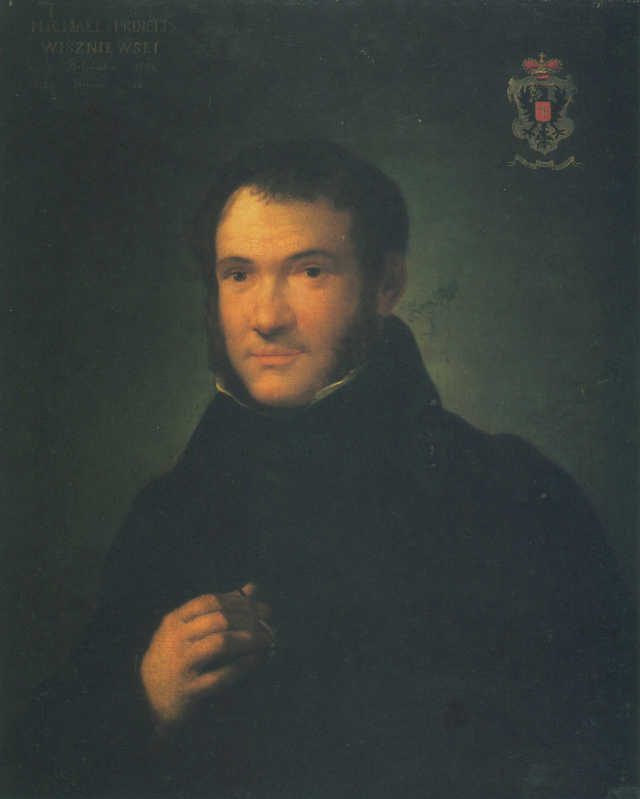Michał Wiszniewski on:
[Wikipedia]
[Google]
[Amazon]
 Michał Wiszniewski (27 September 1794 – 22 December 1865) was a Polish philosopher,
Michał Wiszniewski (27 September 1794 – 22 December 1865) was a Polish philosopher,
* ''O rozumie ludzkim (On the Human Mind; 1848) * ''Historia literatury polskiej'' (A History of Polish Literature; vols. 1–10, 1840–57)
 Michał Wiszniewski (27 September 1794 – 22 December 1865) was a Polish philosopher,
Michał Wiszniewski (27 September 1794 – 22 December 1865) was a Polish philosopher, psychologist
A psychologist is a professional who practices psychology and studies mental states, perceptual, cognitive, emotional, and social processes and behavior. Their work often involves the experimentation, observation, and interpretation of how ...
, and literary historian
The history of literature is the historical development of writings in prose or poetry that attempt to provide entertainment, enlightenment, or instruction to the reader/listener/observer, as well as the development of the literary techniques ...
.
Life
Wiszniewski graduated from the celebrated Krzemieniec Lyceum (secondary school), where he subsequently taught for a time. In 1831 he became a professor atKraków
Kraków (), or Cracow, is the second-largest and one of the oldest cities in Poland. Situated on the Vistula River in Lesser Poland Voivodeship, the city dates back to the seventh century. Kraków was the official capital of Poland until 159 ...
's Jagiellonian University. He was a conservative activist during the Kraków Uprising
The Kraków uprising ( Polish: ''powstanie krakowskie'', ''rewolucja krakowska''; German: ''Krakauer Aufstand''; Russian: ''краковское восстание'') of 1846 was an attempt, led by Polish insurgents such as Jan Tyssowski and ...
of 1846. In 1848 he emigrated to Italy
Italy ( it, Italia ), officially the Italian Republic, ) or the Republic of Italy, is a country in Southern Europe. It is located in the middle of the Mediterranean Sea, and its territory largely coincides with the homonymous geographical ...
.
Wiszniewski was an epigone of the Polish Enlightenment
The ideas of the Age of Enlightenment in Poland were developed later than in Western Europe, as the Polish bourgeoisie was weaker, and szlachta (nobility) culture (Sarmatism) together with the Polish–Lithuanian Commonwealth political system (Go ...
, and at the same time a precursor of Positivism
Positivism is an empiricist philosophical theory that holds that all genuine knowledge is either true by definition or positive—meaning ''a posteriori'' facts derived by reason and logic from sensory experience.John J. Macionis, Linda M. ...
.
He authored a pioneering book on ''Characters of Human Minds'', which is regarded as the first Polish work in the field of psychology
Psychology is the scientific study of mind and behavior. Psychology includes the study of conscious and unconscious phenomena, including feelings and thoughts. It is an academic discipline of immense scope, crossing the boundaries betwe ...
.Information from the Polish Wikipedia article on "Michał Wiszniewski", 17 April 2009, 13:51, edition.
Works
* ''Bacona metoda tłumaczenia natury'' (Bacon
Bacon is a type of salt-cured pork made from various cuts, typically the belly or less fatty parts of the back. It is eaten as a side dish (particularly in breakfasts), used as a central ingredient (e.g., the bacon, lettuce, and tomato sa ...
's Method of Explaining Nature; 1834)
* ''Charaktery rozumów ludzkich'' (Characters of Human Minds; 1837, English edition 185* ''O rozumie ludzkim (On the Human Mind; 1848) * ''Historia literatury polskiej'' (A History of Polish Literature; vols. 1–10, 1840–57)
See also
* History of philosophy in Poland#Messianism, History of philosophy in Poland *List of Poles
This is a partial list of notable Polish or Polish-speaking or -writing people. People of partial Polish heritage have their respective ancestries credited.
Science
Physics
* Czesław Białobrzeski
* Andrzej Buras
* Georges Charp ...
Notes
References
* "Wiszniewski, Michał," ''Encyklopedia Powszechna PWN'' (PWN Universal Encyclopedia),Warsaw
Warsaw ( pl, Warszawa, ), officially the Capital City of Warsaw,, abbreviation: ''m.st. Warszawa'' is the capital and largest city of Poland. The metropolis stands on the River Vistula in east-central Poland, and its population is official ...
, Państwowe Wydawnictwo Naukowe
Wydawnictwo Naukowe PWN (''Polish Scientific Publishers PWN''; until 1991 ''Państwowe Wydawnictwo Naukowe'' - ''National Scientific Publishers PWN'', PWN) is a Polish book publisher, founded in 1951, when it split from the Wydawnictwa Szkolne i ...
, vol. 4, 1976, p. 660.
* Polaczkówna, M., "''Michał Wiszniewski, 1830-1848''," ''Rocznik krakowski'', vol. 12, 1910.
* Kadler, A., "''Działaność filozoficzna Michała Wiszniewskiego''," ''Charisteria: Rozprawy filozoficzne'', 1960.
* Bańka, J., ''Poglądy filozoficzno-społeczne Michała Wiszniewskiego'', 1967.
1794 births
1865 deaths
Jagiellonian University alumni
19th-century Polish philosophers
Polish psychologists
Polish literary historians
{{Poland-bio-stub